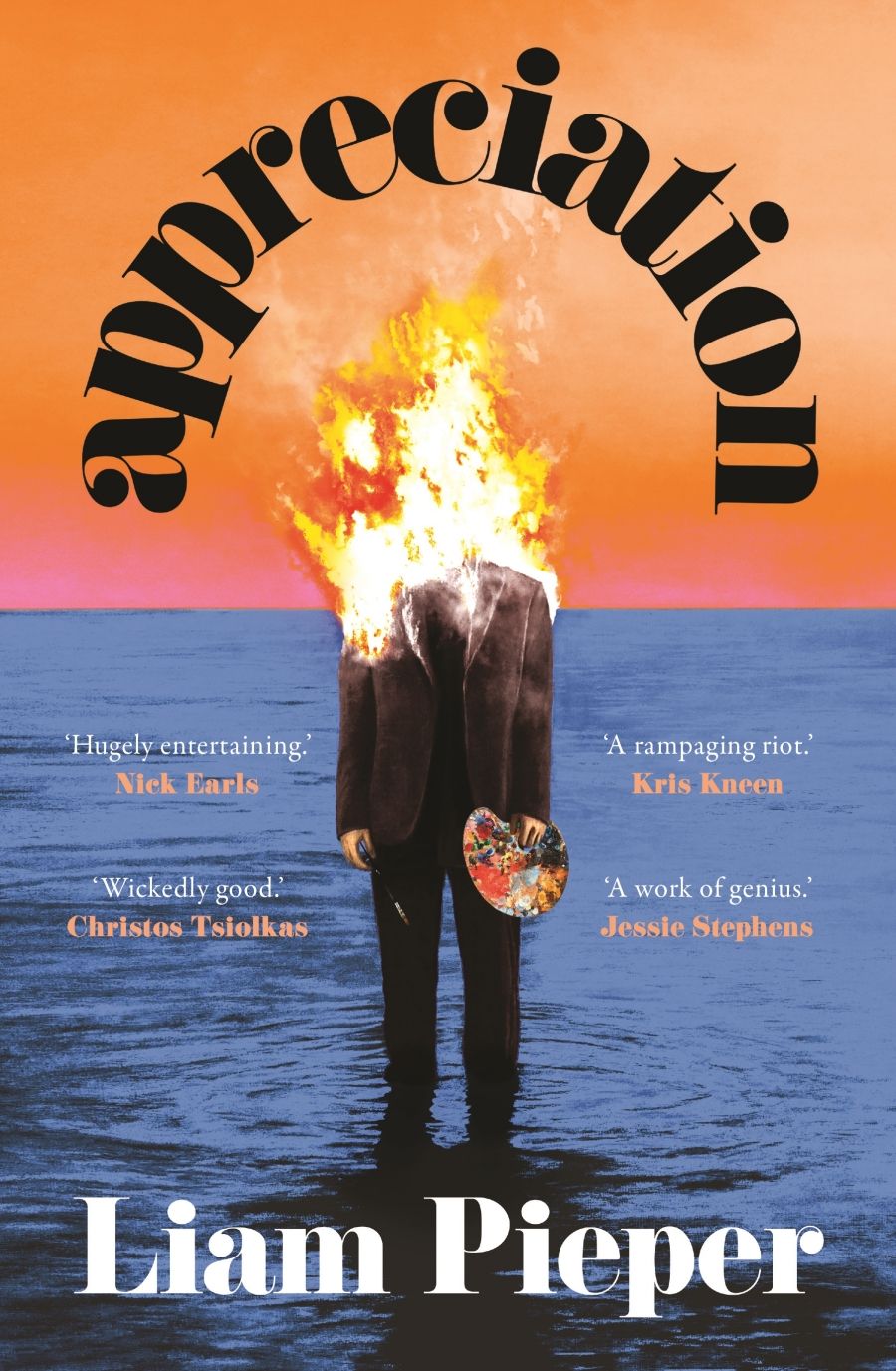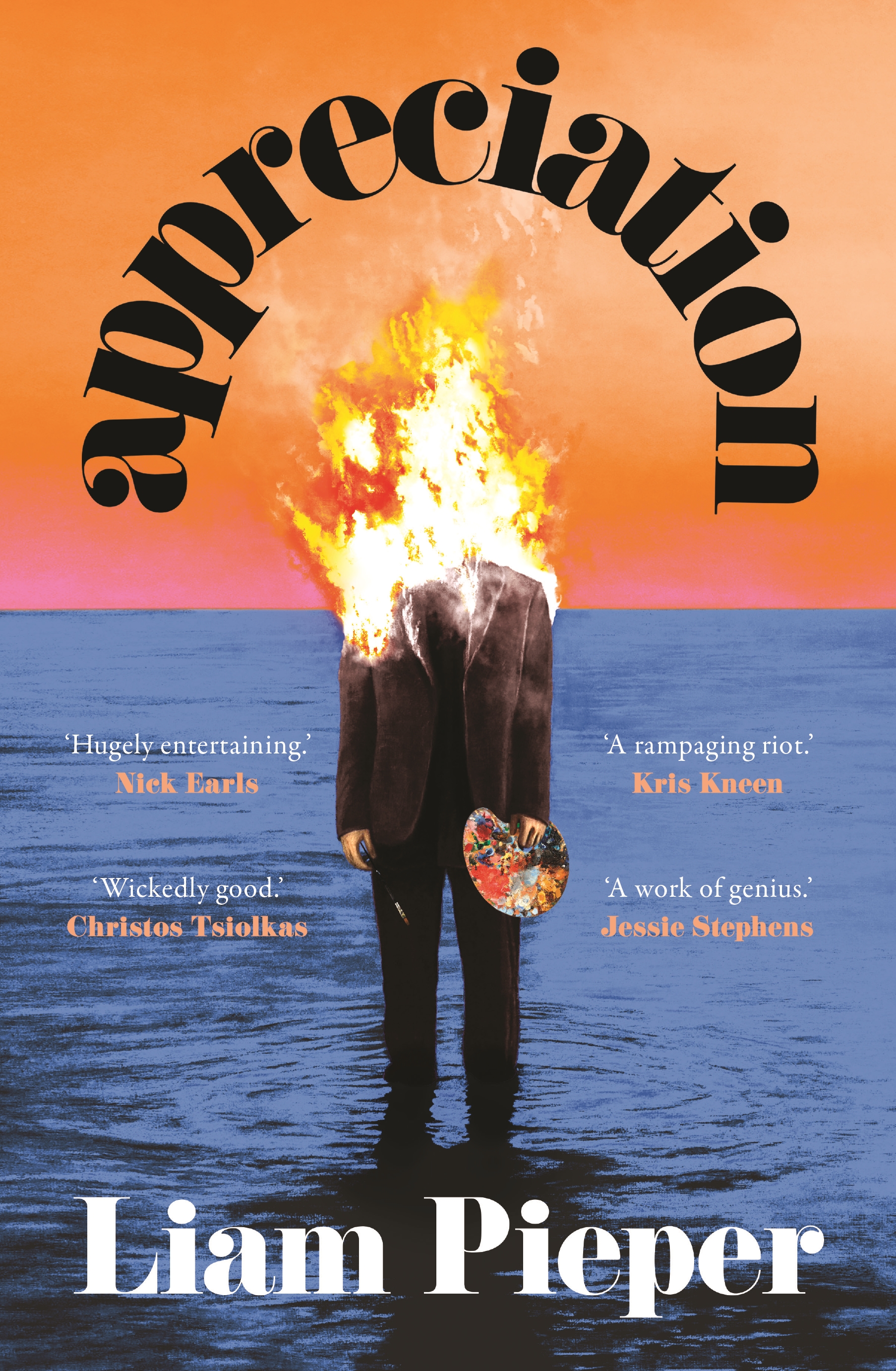
- Free Article: No
- Contents Category: Fiction
- Review Article: Yes
- Article Title: Restlessness
- Article Subtitle: Ghost writing as recuperative practice
- Online Only: No
- Custom Highlight Text:
‘There are only so many ways to make a story work.’ So begins Liam Pieper’s new novel, Appreciation, a hyper-contemporary chronicle of one artist’s vain attempt to redeem his reputation in the eyes of a disappointed public. Drug-addled, egomaniacal, and hopeless, Oli Darling – an enfant terrible of Australian art – is in desperate need of rehabilitation. And the advice of his equally desperate coterie? Employ a ghost writer and publish your memoir, of course. Pieper having made a career of his own in ghost writing, Appreciation cuts close to the bone. As the opening line suggests, however, there is little room for redemption when all the ways of making your story work have been exhausted.
- Featured Image (400px * 250px):

- Alt Tag (Featured Image): Eli McLean reviews ‘Appreciation’ by Liam Pieper
- Book 1 Title: Appreciation
- Book 1 Biblio: Hamish Hamilton, $34.99 pb, 358 pp
- Book 1 Cover Small (400 x 600):

- Book 1 Cover (800 x 1200):

Pieper has tried his hand at disparate genres across fiction and non-fiction, including a historical novel (The Toymaker, 2016), a drama set in Southeast Asia (Sweetness and Light, 2021), a memoir (The Feel-Good Hit of the Year, 2014), and a self-deprecating collection of essays responding to that memoir and why he regrets having written it (Mistakes Were Made, 2015). Despite significant critical acclaim, Pieper seems restless, at pains to establish his public identity as a writer with a capital W, without having found a clear voice in which to ground that identity. Indeed, Pieper’s dedication to Miriam Gregory sheepishly concedes that she ‘would have liked this one, I promise’. Nevertheless, it is wise of Pieper to recognise this restlessness as fertile ground for fictional material, weaving his professional and personal experience as ghost writer and working artist into the novel’s fabric.
Appreciation opens with Oli Darling, celebrity artist and anti-hero, on the precipice of a new exhibition. His career flagging, his initial artistic daring now tragically inert, Oli hits rock bottom at the end of the press day with an appearance on a panel show one can infer to be Q+A. Having taken too much cocaine that morning, Oli’s political, social, and moral hang-ups spool out before the live studio audience under pressure from a righteously angry interlocutor. Coming home from the studio after his woeful performance, Oli is greeted immediately by the spectre of ‘cancellation’. Pieper, who has the ear of a screenwriter, builds an excellent comic tension as Oli disintegrates, and rightly mocks the petit-bourgeois patter that defines so much public discourse in this country. A sense of timidity on Pieper’s part is also evident, as if the author feels the need to pre-empt a negative critical response by couching these hard-line political positions in the persona of a character who is, from the outset, an embarrassing public spectacle. This delegitimisation of the self, mirrored between novel and author, becomes a potent feature of the novel as Oli’s ghost-written memoir is introduced as the central plot device.
Pieper understands ghost writing as both a profession and a unique artistic and business practice. It makes sense that he would draw on it for this novel – where else is the relationship between writer and text so heavily mediated and dislocated? The use of this framing device, however, begs an important question – why now, and why in this way? We are now at a sharply polarised juncture in public discourse, which Pieper does gesture towards, particularly in Oli’s TV appearance, but the scathing critiques of the art world and its social responsibility that could be made in this novel fall flat when presented through this medium. The one major downside to Pieper’s ghost writing experience is that it seems to have prevented him from developing his own clear authorial style, so used is he to speaking in other voices. Appreciation, at the level of form, structure, and style, is a predictable character study, infused with just enough levity here and tragedy there to keep the wheels turning, but doing nothing remarkable. Despite the occasional ear for a witty phrase – Oli’s agent Anton is described as ‘living his life with the steady and honourable purpose of a Roomba’ – Pieper’s prose feels stale and generic at moments when it should be rich and evocative. In one instance, Oli’s country hometown is described as a ‘sleepy, sun-baked town in the middle of nowhere’, a clichéd phrase where he might have evoked a visceral sense of isolation.
These granular deficiencies add up to a novel that seems unsure of what it wishes to be, and what exactly it wants to critique. What seems to have been marketed as an excoriating satire of the Australian art scene is instead a plodding profile of one very annoying and uninspiring artist. The sudden shift in narration in the novel’s final thirty pages, a moment that could be Nabokovian in its metafictional intensity, is instead wholly predictable and rather ineffectual. Perhaps this was Pieper’s intention – to write a novel from the perspective of a ghost writer frustrated with her subject’s resounding lack of malleability and a lifetime of gendered discrimination, getting her revenge by enshrining his life’s work in a book of inert prose and archetypal characters. Giving Pieper the benefit of the doubt, I’d say this is an impressive feat. But all that glitters is not gold. This is not nearly the best the author could do with this material.
Pieper is clearly someone with a suite of artistic and political opinions refined through a lifetime immersed in writing and its professional milieu. A writerly personality of this calibre needs a distinct voice to match it. The best way for Pieper to find this voice is to ignore his novel’s opening line: there is not, and has never been, a limited number of ways to make a story work. You just need to find the right one.


Comments powered by CComment